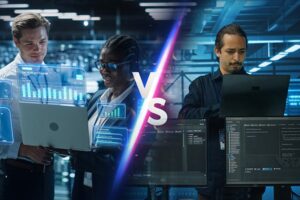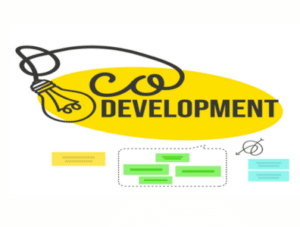
Table of Contents
evolving role of software:
From background to foreground, software used to be the unseen instructions that powered our devices. Now, it’s at the forefront, shaping user experiences and driving innovation in fields like AI and automation.
Intelligence on the Rise: With the rise of machine learning, software is becoming increasingly intelligent. It can analyze data, make predictions, and even interact with us in natural language.
Beyond Devices: Software is no longer confined to computers and phones. It’s embedded in everything from cars and appliances to medical devices and infrastructure. This “Internet of Things” (IoT) is creating a more interconnected world.
Focus on User Experience: Software development is now heavily focused on creating intuitive and user-friendly experiences. Usability and accessibility are becoming top priorities.
Security Concerns Grow: As software becomes more complex and interconnected, security vulnerabilities become a bigger concern. Developers are constantly working on ways to make software more secure.
deeper into the evolving role of software:

- From Product to Platform: Software is now more than just a completed product. Numerous applications are developing into platforms that let users add, modify, and develop new features. Consider open-source software and app marketplaces.
- The Subscription Revolution:Subscription services are replacing software purchases made in the old fashion. This makes it possible for regular upgrades, cheaper initial expenses, and access to ever expanding functionality.
- Cloud-Based Transformation:Software is being moved to the cloud, where it may be accessed from any location with an internet link. This makes updates and maintenance easier and does away with the requirement for local installations.
- Rise of Low-Code/No-Code Development:The process of creating software is getting easier. Software creation is becoming more accessible to people with little to no coding skills because to low-code and no-code solutions.
- The Age of Agile Development:Agile approaches are taking the role of the conventional waterfall development strategy. This makes it possible for software to iterate more quickly, adapt to changing requirements, and improve continuously.
- AI-Powered Development: Software is developed using software itself! AI tools are helping with software design processes in their entirety as well as code development and issue detection.
- The Ethical Debate:Ethical considerations arise with the increasing sophistication of software. There is a lot of ongoing discussion on topics like algorithmic bias, data privacy, and the effect of automation on employment.

Domain-Specific Languages (DSLs): These are specialist programming languages made for particular jobs or sectors of the economy. DSLs further blur the boundaries between user and developer by making it simpler for non-programmers to interact with and even create software customized to their needs.
The Democratization of Data: A major factor in increasing the usability and accessibility of data is software. Self-service BI (business intelligence), analytics platforms, and data visualization technologies enable people to examine and comprehend data without requiring technical knowledge.
The Rise of Progressive Web Apps (PWAs): PWAs are web apps that perform similarly to apps, making it harder to distinguish between mobile apps and websites. This eliminates the requirement for app store downloads and enables simpler access to apps with a broader reach.
The Edge Computing Revolution:Edge computing brings software processing closer to the data source. In domains such as IoT and autonomous systems, this facilitates real-time applications, lowers latency, and enhances responsiveness.
The Evolving Landscape of Security: As software becomes more complex, so do the security threats. New approaches like blockchain and quantum-resistant cryptography are emerging to address evolving security challenges.
Software as a Service (SaaS) and the Subscription Economy:The popularity of SaaS models is transforming entire industries. Software is now available everywhere, scalable, and supplied as a service, with recurring subscription fees taking the place of one-time purchases. This encourages quick development cycles and creativity.
The Human-Machine Interface: Our interactions with software are always changing. With the development of voice assistants, augmented reality (AR), virtual reality (VR), and natural language processing (NLP), the distinction between the real and digital worlds is becoming increasingly hazy, leading to more complex and engaging software experiences.
Bioware and Medical Applications: Software is playing a crucial role in advancements like bioprinting organs, developing personalized medicine through genetic analysis, and even using AI for medical diagnosis and treatment planning.
Software for Social Good: Software is being used to tackle global challenges like climate change, poverty, and education inequality. Think disaster prediction models, educational platforms in remote areas, and logistics optimization for humanitarian aid.
The Future of Work: Software is automating tasks, transforming industries, and creating new job opportunities. This necessitates continuous learning and adaptation by the workforce to stay relevant.
The Algorithmic Society: As software makes more decisions, transparency and fairness in algorithms become paramount. Explainable AI and ethical considerations in code design are crucial for a future where software plays a significant role in societal decision-making.
The Final Frontier: Space Exploration: Software is vital for spacecraft navigation, mission control, and data analysis in space exploration. It’s the backbone of space exploration efforts, pushing the boundaries of scientific discovery.
The Democratization of Creativity:Software that makes creative expression more accessible, like design tools, 3D printing apps, and AI-powered music-generating tools, is fostering a new era of collaborative and democratized creation.



